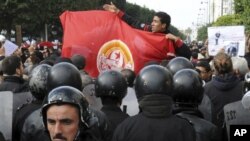A week after protests toppled Tunisian dictator President Zine el-Abidine Ben Ali, Tunisians again took to the streets Friday as the country mourned the victims of weeks of unrest.
Tunisian police participated for the first time in demonstrations in downtown Tunis against the interim government and old ruling RCD party of former strongman Zine el-Abidine Ben Ali. Burly officers in uniform tied red ribbons on their arms, symbolizing the color of the Tunisian flag - and their solidarity with the demonstrators.
'We Tunisians, young and old, are all together,' one policeman said. 'We are united and we regret our martyrs haven't been wrapped in the Tunisian flag.'
Tunisia's military is popular here, and the tanks manning the Tunis streets are blanketed with flowers. Ordinary Tunisians credit the army protecting protesters against tear-gas wielding riot police and reestablishing order. By contrast, police are seen as symbols of Ben Ali's repressive regime.
But the demonstrators here welcomed those police who joined their ranks.
"This manifestation [shows] that police, army, citizens, we are all Tunisian," said a woman. "We seek freedom we seek dignity, we seek everything for Tunisia, for the best of Tunisia."
The demonstrations gathered hundreds in the capital and in other parts of the country, as Tunisia began three days of national mourning for the victims of weeks of unrest. The United Nations says about 100 people have died since the start of the uprising in December, while the government estimates at least 78 dead.
The interim government has moved swiftly to implement a series of reforms. It has also promised elections, arrested members of the Ben Ali clan, launched corruption probes against them and and frozen their assets. But protesters want every trace of what they consider the old corrupt and dictorial regime banished - including senior members of this caretaker government.




